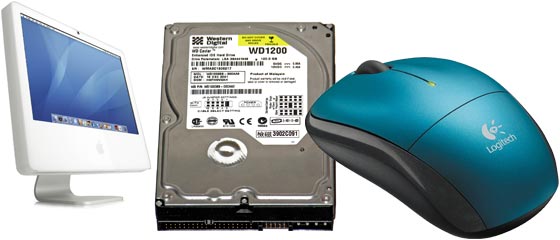 ![[Header]](../XuShared2/Line3.jpeg)

Add a Comment (Go Up to OJB's Blog Page) File SystemsEntry 550, on 2007-06-07 at 20:21:29 (Rating 1, Computers) According to information accidentally (presumably) leaked by Jonathan Schwartz at a recent Sun event, ZFS will be the new file system for Mac OS X 10.5, Leopard. If the information at Sun's site, and at Wikipedia, about ZFS is true it is a really impressive file system. In fact, if only half the claims about it are true it will be a worthwhile improvement for the next version of the Mac OS.
I still have to deal with occasional corruptions in the current Mac file system, HFS Extended. Yesterday I recovered a damaged laptop drive, and today I saved data from a drive from an Intel iMac. In both cases the only software which worked was DiskWarrior 4. I think this program is one of the essentials all Mac support staff should have. I use Apple's Disk Utility first, because that fixes basic problems and seems to never make the problem worse. If that fails I move on to DiskWarrior, and if that won't unscramble the disk, there's a good chance the data really is gone.
If the disk has hardware damage: failure to spin up, a head crash, etc, I have to resort to more serious techniques, such as freezing, heating, or dropping the disk, or swapping the controller board. Sometimes its possible to get the drive going for long enough to get the data off, but I always replace a drive which shows any signs of problems, even when I think it has been fixed. The price of a new drive is worthwhile compared with the potential risk involved in using a bad drive and losing files.
I don't know when solid state memory will be a viable alternative to hard disks. Flash memory devices are getting faster, bigger, and cheaper all the time, but so are conventional hard disks. Yesterday a one terabyte drive was announced. Flash drives are still sitting around 8GB. Of course, many users only need around 20GB of space, so flash memory will be practical for them quite soon. But recently more users want to store big photo and music collections, so large hard disks will be the only option for them for a while.
I would be prepared to replace my 160GB laptop hard disk with a similar capacity flash based drive even if it cost twice as much. The speed, reliability, power consumption and noise improvements would be worth it. But it will be a while yet before that sort of capacity is available at a reasonable price, so I'll just make sure I keep good backups until then!
 There are no comments for this entry. 
You can leave comments about this entry using this form. To add a comment: enter a name and email (both optional), type the number shown above, enter a comment, then click Add.
Note that you can leave the name blank if you want to remain anonymous.
Enter your email address to receive notifications of replies and updates to this entry.
The comment should appear immediately because the authorisation system is currently inactive.
![[Comments]](../XuShared/Comment1B.jpeg) ![[Preview]](../XuShared/Comment6B.jpeg) ![[Blog]](../XuShared/Up2B.jpeg)
|

![[Comments]](../XuShared/Comment1B.jpeg)
![[Preview]](../XuShared/Comment6B.jpeg)
![[Blog]](../XuShared/Up2B.jpeg)